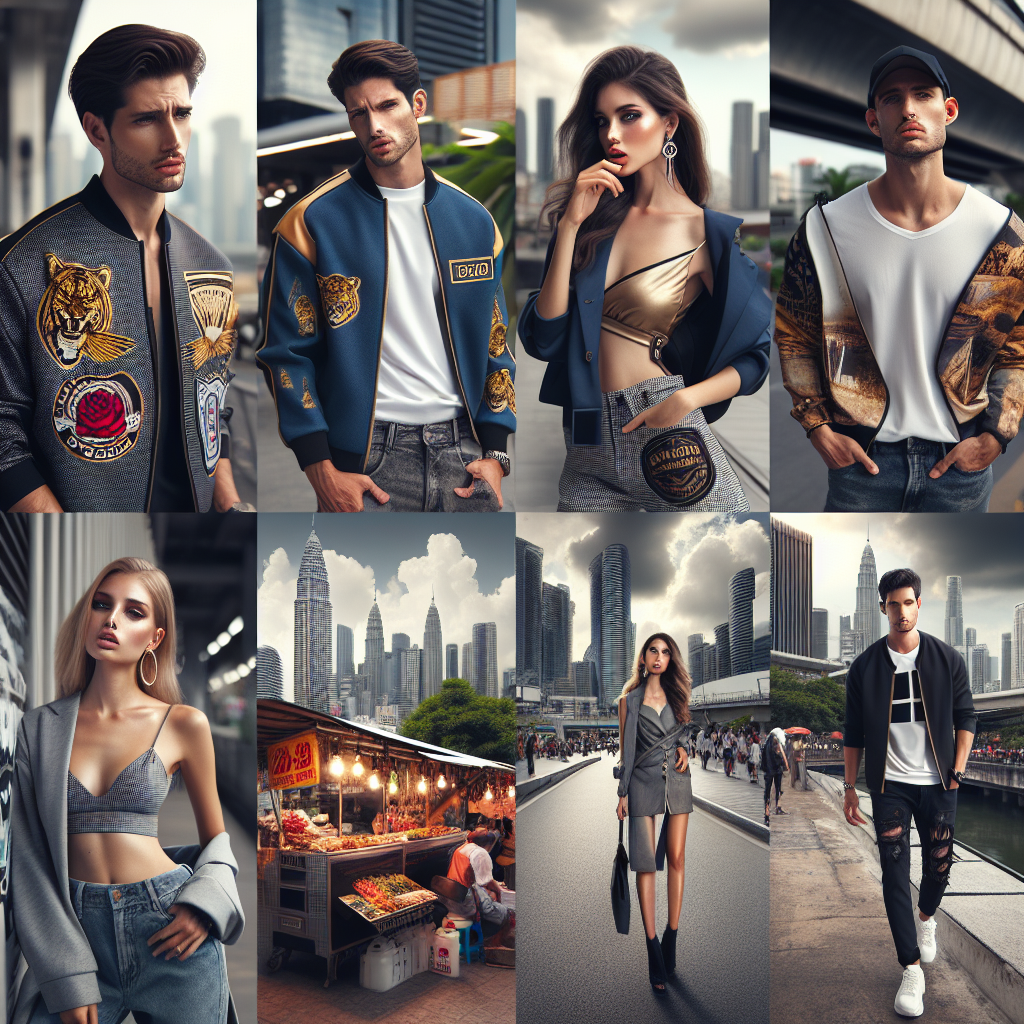Discover Innovative Clothing Brands with Logos to Elevate Your Style

How Clothing Brands with Logos Are Shaping Modern Fashion Trends

Clothing brands with logos have become the distinctive emblems of our times, marking a shift in how we express ourselves through fashion. This chapter dives into the impact of branded logos on modern fashion trends, reflecting what they represent to consumers and how they influence buying decisions.
Take, for instance, the enduring power of the Nike Swoosh. This logo isnt just a brand mark—its a symbol of excellence in athletic performance. With clothing brands with logos being a critical factor for consumers, Nikes iconic design draws in millions of buyers looking for quality and status. In fact, reports show that nearly 70% of consumers prefer shopping for branded clothes, highlighting the importance of logos in todays market.
Case Studies: Impact of Logo Brands
Lets explore specific brands that have successfully leveraged logos to impact fashion trends:
- Adidas: The three stripes arent just about style; theyre associated with authenticity and quality. Adidas has successfully navigated collaborations, such as those with Kanye West, further elevating their logos status.
- Gucci: Their double G logo is not just a simple design; it has become synonymous with luxury worldwide. This association reflects not just wealth but a lifestyle choice embraced by consumers aged 18 to 65.
- Supreme: A streetwear phenomenon, the Supreme logo creates a sense of exclusivity and community, attracting younger fashion enthusiasts willing to queue for hours.
Fashion Trends and Brand Loyalty
Clothing brands with logos play a significant role in shaping not just consumer preferences but also trends. Many people, particularly women and men aged 18 to 35, are more likely to purchase items that feature recognizable logos. What draws them in? Its a blend of social validation and personal identity. When you don a piece with a brand logo, youre making a statement about who you are, where youve been, and what you value.
Statistically, brands like Gucci and Nike have seen a consistent increase in sales, which correlates with strategic logo placements across platforms. According to the latest data, branded clothing has experienced a notable market increase of around 10% year-over-year.
The Influence of Digital Marketing
Todays clothing brands with logos invest heavily in digital marketing. From Instagram ads featuring influencers flaunting their latest gear to targeted Google AdWords campaigns, brands are continuously adapting to market trends. Every successful brand has learned to connect with consumers on a personal level, making them feel part of an exclusive club.
Real Stories: Logo Branding in Action
Meet Alex, a 30-something marketing manager. He often chooses clothing brands with logos because they resonate with his desire for credible style. Alex recalls a time when he wore a simple branded sweatshirt to a corporate event and received compliments that enhanced his confidence. The logo represented not just fashion; it reflected his professional persona.
Another story comes from Sarah, a fashion student who invested in a luxury handbag with a prominent logo. For her, it was more than just a purchase; it was an investment in her future. She believes that brands like Louis Vuitton open doors, refine her style, and increase her marketability as she enters the competitive job market.
Expert Advice: Choosing the Right Logos
With numerous options available, how do you select the right clothing brands with logos? Here are some expert tips:
- Understand your personal style and how a logo reflects it. ⭐
- Consider the perception of the brand in your social circles. ⭐️
- Invest in quality; a well-made item with a logo can be more beneficial in the long run. ⭐
- Stay updated on modern trends as branding evolves swiftly. ⭐
- Think about versatility; logos should complement various outfits. ⭐
Conclusion: Why Logos Matter
As we’ve seen, clothing brands with logos have not only made significant impacts on fashion trends but also have shaped consumer identities globally. Whether its a casual tee or a high-end jacket, these logos influence choices, foster loyalty, and represent an ability to connect with broader cultural conversations.
Are you ready to dive into your own branded journey? Contact us at nexrilo.com or call [email protected]. Our expert team is eager to assist you—whether you’re rebranding, evolving your business identity, or just starting with a logo, we’ve got it all bundled in one place!
| Brand | Logo Significance | Trends Influenced | Consumer Demographic |
| Nike | Performance and Excellence | Sportswear Evolution | 18-40 |
| Adidas | Authenticity | Streetwear & Athluxury | 18-35 |
| Gucci | Luxury Representation | High Fashion Trends | 25-55 |
| Supreme | Exclusivity | Streetwear Culture | 16-30 |
| Chanel | Timeless Elegance | Classic Trends | 30-60 |
| Puma | Sporty Chic | Activewear Growth | 18-35 |
| Balenciaga | Rebellious Avant-Garde | High-End Street Fashion | 20-45 |
| Versace | Bold Luxury | Glamorous Culture | 30-50 |
| Ralph Lauren | American Classic | Preppy Fashion | 25-65 |
| H&M | Affordable Fashion | Sustainable Trends | 18-40 |
If youre excited to enhance your style or even begin your journey in the world of branded fashion, don’t hesitate! Reach out today!
What Are the Myths About Clothing Brands with Logos That Every Consumer Should Know?

In the world of fashion, wearing clothing brands with logos can invoke strong feelings, associations, and sometimes misconceptions. Many consumers, ranging from teenagers to professionals, fall prey to myths that can influence their buying decisions. In this section, we’ll debunk these myths and provide clarity on what they truly mean for consumers.
Myth 1: Logos Guarantee Quality
One common myth is that if a garment features a well-known logo, it must be of high quality. Unfortunately, this isnt always true. While clothing brands with logos like Gucci or labels like Nike often signify quality craftsmanship, some logo-bearing items are mass-produced and may not meet the expected quality standards.
For example, consider a trendy fast-fashion retailer where items with bold logos fly off the shelves. Despite the prominent branding, consumers might find after a few washes that the clothing has lost its shape, color, or overall appeal. It’s essential to scrutinize the garment itself rather than simply relying on a logo.
Myth 2: Wearing Logos Is Snobbish
Many believe that sported logos represent elitism, making those who wear them seem snobbish or disconnected. Yet, this perception varies significantly across age groups and cultures. For instance, younger consumers often embrace streetwear brands that proudly flaunt their logos as symbols of authenticity and community! ⭐
Consider Alex, a college student who proudly wears his Supreme hoodie. To him, it isn’t about snobbery; its about belonging to a culture that celebrates creativity and individuality. While the logo might carry a status, it also serves to foster identity rather than exclusion.
Myth 3: Logos Make You Look Overly Fashionable
Another widespread misconception is that wearing branded clothing makes an individual look overly dressed up or fashionable. On the contrary, logos can lend balance to outfits. A simple pair of jeans paired with a logo shirt can create an effortlessly stylish look.
- For casual outings, a clothing brand with logo T-shirt can serve as a focal point.
- In contrast, combining loud graphics with understated pieces can achieve a sophisticated and sleek appearance. ⭐
- Additionally, many people opt for logo apparel for comfort rather than style.
Myth 4: Logos Are Only for Style Seekers
Many assume that wearing logos is solely for fashion-forward individuals. However, numerous consumers wear branded clothing for functionality and durability, particularly in daily or professional settings. For instance, outdoor enthusiasts often favor trusted brands with logos like Patagonia or The North Face, not just for their prestige but for the gears reliability in harsh conditions. ⭐️
Logos can thus imply a commitment to quality and performance, attracting those who value substance over mere appearance.
Myth 5: Logos Are Only Temporary Trends
While fashion trends may come and go, many iconic logos have stood the test of time. Brands like Levis, Nike, and Chanel have mastered the art of timelessness while staying relevant through new marketing strategies and collaborations. ⭐️
These brands constantly evolve to meet the changing tastes of their customers, offering fresh designs while retaining core elements that make their logos instantly recognizable. As the adage goes, “fashion fades, but style endures.” Why? Because a well-crafted logo speaks to the brand’s identity and customer loyalty, transcending mere seasonal trends.
Expert Opinion: The Importance of Being Informed
Industry experts stress the importance of being informed rather than relying solely on perceptions about clothing brands with logos. Jenna, a fashion consultant, emphasizes that deviating from these myths can lead to more informed purchasing decisions. She advises consumers to evaluate quality, sustainability, and how a brand aligns with their personal values rather than just aesthetic appeal.
Consumers today are increasingly aware of these misunderstandings and are embracing more thoughtful shopping habits, seeking brands that resonate with their ethics and lifestyles. ⭐
Conclusion: Knowledge is Power
Ultimately, knowing the facts behind the common myths of clothing brands with logos empowers consumers. Armed with this knowledge, you can make choices that align with your values without falling prey to misconceptions. So, the next time you’re considering that logo-emblazoned piece, remember to look beyond the surface—it’s all about quality, identity, and personal expression!
If you have questions about selecting the right brands or need assistance with your branding strategy, contact us at nexrilo.com or call [email protected]. Our team of professionals is ready to guide you through your fashion journey!
Fill out the form below and our team will reach out within one business day
